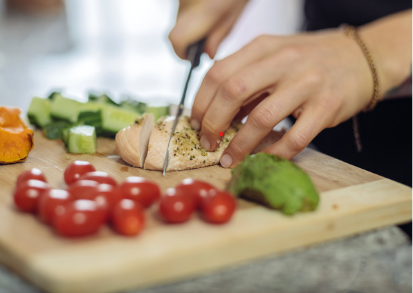Cooking with ADHD: Strategies for Success

Living with ADHD can present unique challenges in various aspects of life, including daily tasks like preparing meals. The kitchen, with its multiple steps, ingredients, and potential distractions, can be particularly overwhelming.
However, with the right strategies and a bit of planning, cooking can become an enjoyable and manageable activity. In this blog post, we’ll explore practical tips and tricks to make meal preparation more ADHD-friendly.
Create a Structured Meal Plan: Start by planning your meals for the week ahead. Having a structured meal plan reduces decision-making stress and provides a clear roadmap for your culinary adventures. Consider incorporating a variety of easy-to-prepare recipes that share common ingredients to streamline the cooking process.
Break Tasks into Manageable Steps: ADHD brains can struggle with multi-step processes. Break down cooking tasks into smaller, more manageable steps. For instance, instead of thinking about making spaghetti bolognese, focus on individual steps like chopping vegetables, browning meat, and simmering the sauce. This makes the overall process less overwhelming.
Utilize Timers and Alarms: Set alarms or timers to help you stay on track during each cooking step. This not only helps with time management but also serves as a reminder to stay focused.
Organize Your Workspace: A cluttered kitchen can lead to distraction and frustration. Before you start cooking, organize your workspace. Clear countertops, organize ingredients and keep necessary utensils within easy reach. An organized kitchen reduces the cognitive load and makes the cooking process more enjoyable.
Choose Simple and Quick Recipes: Choose recipes that have fewer ingredients and shorter cooking times. Simple doesn’t mean boring—many delicious meals can be prepared with just a handful of ingredients. This approach minimizes the chances of losing focus and helps you get a tasty meal on the table faster.
Incorporate Mindful Cooking Techniques: Engage in mindful cooking by focusing on the sensory aspects of the process. Pay attention to the colours, smells, and textures of the ingredients. This mindfulness can help keep your attention anchored to the task at hand.
Prep Ingredients in Advance: Save time and reduce stress by prepping ingredients ahead of time by:
- Chop vegetables, measure out spices, and marinate proteins in advance (pre-marinate meats by packaging with marinade in a freezer bag and freeze for future use).
- Consider buying pre-shopped ingredients at the grocery store.
If able to, consider utilizing meal prep services.
Use Visual Reminders: Create visual cues to help you remember important steps. Post-it notes, recipe cards, or even visual diagrams can serve as reminders. Having a visual reference can be especially helpful when transitioning between different stages of the cooking process.
Set Realistic Expectations: Understand and accept that not every meal needs to be a gourmet masterpiece. Setting realistic expectations for yourself can alleviate unnecessary pressure. Focus on nourishing, satisfying meals rather than aiming for perfection. Celebrate the effort you put into preparing a meal rather than fixating on any perceived imperfections.
Create a Cooking Playlist: Music can be a powerful tool to enhance focus and motivation. Curate a playlist of your favorite tunes to accompany your cooking sessions. The rhythmic and repetitive nature of music can help establish a steady pace and keep your mind engaged in the task at hand.
Embrace One-Pot and Sheet Pan Recipes: Simplify your cooking process by choosing recipes that require minimal cleanup. One-pot and sheet pan recipes not only reduce the number of dishes but also streamline the cooking process. This approach minimizes the chances of becoming overwhelmed by a sink full of dirty dishes.
Incorporate Multitasking and Mindfully: While multitasking might seem challenging for individuals with ADHD, incorporating it mindfully can be helpful. For example, while waiting for water to boil, you can chop vegetables or set the table. Just be cautious not to take on too many tasks simultaneously, as it might lead to distraction.
Involve Others in the Cooking Process: Turn meal preparation into a social activity by cooking with a friend, family member, or partner. Having someone to share the tasks with can make the process more enjoyable and provide an extra set of hands and eyes to help you stay focused. Meal prep days can be an opportunity to get together with friends to batch cook together. Breaking the tasks amoungst each other for simplicity and efficiency. At the end you will have freezer ready meals for days or weeks to come.
Experiment with Aromatherapy: Certain scents can have a calming effect and enhance focus. Experiment with aromatherapy by using essential oils or fresh herbs while cooking. Scents like lavender, rosemary, or citrus can create a pleasant atmosphere in the kitchen and positively impact your cooking experience.
Practice Self-Compassion: Living with ADHD comes with its own set of challenges, and it’s important to be kind to yourself. If a cooking session doesn’t go as planned or you forget an ingredient, practice self-compassion. Learn from the experience and use it as an opportunity for growth rather than a reason for self-criticism.
Cooking with ADHD is a journey that involves experimentation, adaptation, and self-discovery. By incorporating these strategies and details into your cooking routine, you can turn the kitchen into a space of creativity and empowerment. Remember that the goal is not perfection but the joy of creating meals that suit your preferences and needs. With patience, planning, and a sprinkle of self-compassion, you can navigate the kitchen with confidence and relish the delicious results.